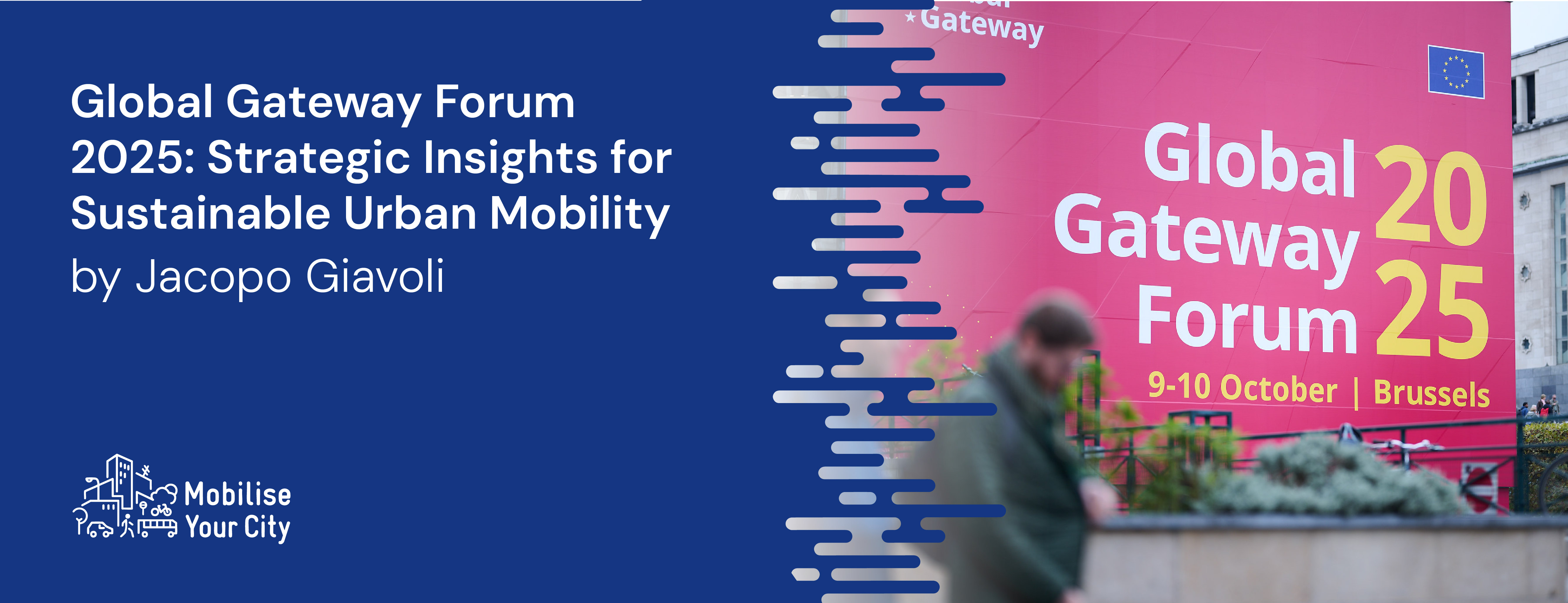Global Gateway Forum 2025: Strategic Insights for Sustainable Urban Mobility

A background paper prepared for the recently concluded Global Gateway Forum explores evolving dynamics in international connectivity investments - offering food for thought for sustainable urban mobility practitioners.
The Global Gateway Forum 2025 took place on October 9-10 in Brussels, bringing together political leaders, policymakers, financiers, and business representatives for a strategic conversation about connectivity partnerships in an era of geopolitical transformation. To frame these discussions, the European Commission commissioned a background paper from leading European think tanks - the Brussels Institute for Geopolitics, Clingendael Institute, and Egmont Institute. This paper, "Partnerships in a Geopolitical Era: Time for a New Strategic Conversation," explores trends in international investment and partnership approaches that may be relevant to sustainable urban mobility practitioners working with MobiliseYourCity.
A World in Transition
The background paper describes shifts in the international landscape since the EU launched its Global Gateway Strategy in 2021. The authors observe a trend in many countries toward viewing economic relationships through multiple lenses, including security considerations alongside traditional development and trade objectives.
For MobiliseYourCity and its partners across Africa, Asia, and Latin America, understanding these broader contextual shifts can help inform how urban mobility projects are conceived and financed.
Three Strategic Rationales
The background paper identifies three different ways that Global Gateway can be understood:
- Traditional development aid: Aligned with UN Sustainable Development Goals, focusing on climate goals and sustainable development - the traditional framework that has guided much international cooperation.
- Alternative investment approach: Offering transparent partnership models with emphasis on high governance standards.
- Mutual economic interests: Advancing partnerships that aim to benefit both Europe and partner countries economically.
For MobiliseYourCity, this third rationale could represent both opportunity and adaptation. Urban mobility projects could increasingly demonstrate not just sustainability credentials, but also how they serve mutual geo-economic interests - strengthening supply chains, connecting markets, and building economic resilience.
What Partner Countries May Be Looking For
Based on their analysis, the paper's authors suggest that many partner countries value certain characteristics in investment partnerships. This could have concrete implications for MobiliseYourCity:
- Local value creation: Bus rapid transit systems, metro networks, and cycling infrastructure should demonstrably build local capacity and create employment. Partner countries expect tangible benefits including job creation and skills development.
- Strategic autonomy: The ability to work with multiple international partners without exclusive commitments, allowing countries to diversify their relationships.
- Speed and clarity: Clearer criteria and more streamlined decision-making in project development and approval.
These observations may resonate with MobiliseYourCity's experience supporting cities in developing sustainable urban mobility plans and projects.
Urban Mobility in a De-Risking Age
Cities are critical nodes in regional and global connectivity networks. The forum's focus on connectivity in a de-risking age highlights how urban mobility now intersects with broader strategic concerns:
- Urban freight and logistics systems as part of broader supply chain networks
- Public transport investments in the context of energy diversification strategies
- Transport corridors that connect cities across borders
- Technology choices in transport systems and their long-term implications
MobiliseYourCity's work on sustainable urban mobility plans can complement these broader connectivity considerations.
Considerations for Urban Mobility Practice
Several themes from the background paper may offer useful reference points for urban mobility work:
Articulating multiple benefits: Urban mobility projects can serve various objectives simultaneously- climate action, economic development, improved quality of life, and regional connectivity.
Stakeholder engagement timing: The paper notes challenges when private sector actors are engaged late in project development. Early involvement of diverse stakeholders, including companies, financial institutions, and local partners, may improve project outcomes.
Technology and standards: Attention to open standards and interoperability can provide flexibility as technology evolves.
Linking urban and regional: Individual city projects may gain additional relevance when connected to broader corridor development and regional integration initiatives.
Evolving Partnership Narratives
The paper discusses how traditional development cooperation narratives are evolving. The authors suggest that framing international partnerships in terms of mutual interests, where different parties can articulate what they gain, may resonate more broadly than earlier approaches.
For MobiliseYourCity, this suggests that urban mobility investments can be understood from multiple perspectives: cities gain sustainable transport systems, European partners gain project experience and market relationships, and both sides can strengthen economic and technical cooperation.
Private Sector Participation
The background paper acknowledges challenges in private sector engagement with large-scale infrastructure initiatives. For urban mobility specifically, attracting private investment can be complex given varied risk profiles and payback periods.
The paper suggests that successful engagement may benefit from:
- Involving financial actors earlier in project conceptualization
- Providing clearer criteria for project eligibility and selection
- Facilitating connections among political and financial stakeholders
These considerations align with MobiliseYourCity's emphasis on multi-stakeholder collaboration in developing and implementing urban mobility projects.
Looking Forward
The background paper raises questions about how international partnerships will evolve in coming years. While the authors discuss various scenarios and challenges, they emphasize the value of maintaining pragmatic connectivity partnerships across different regions and political contexts.
For sustainable urban mobility practitioners, these broader discussions provide context for day-to-day work. Understanding the multiple objectives and perspectives that different stakeholders bring to infrastructure partnerships can help in developing projects that genuinely serve local needs while connecting to wider investment frameworks.
MobiliseYourCity's approach - emphasizing locally-owned solutions, multi-stakeholder collaboration, and practical implementation - can contribute to these evolving partnership models. As the international development landscape continues to shift, maintaining focus on tangible outcomes for cities and their residents remains essential.
The discussions begun at the Global Gateway Forum will likely continue through various channels. For those working on urban mobility, staying informed about these broader strategic conversations can help ensure that sustainable transport remains a priority as global connectivity investments evolve.